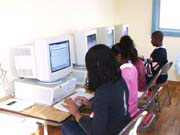Public Service Energy & Gas (PSE&G) has donated 70 refurbished computers to the Jubilee Family Life Center, at 601 Jackson St. The center, which opened in April 2003, has programs that include after-school tutoring, teen and children’s youth groups and summer programs for the children who live in public housing.
Every weekday, anywhere between 50 and 100 neighborhood children between the ages of 5 and 16 spend their afternoons at the center, doing homework or participating in different educational activities.
The All Saints Community Service and Development Corporation (ASCSDC) is the founding organization of the Jubilee Center, and it, in turn, was started by and is still closely associated with the All Saints Episcopal Parish at Seventh and Washington streets.
Laurie Wurm, director of ASCSDC, said Monday that 20 computers will be used to create a permanent computer lab.
“Our goal is have a computer literacy program up and running by the summer,” she said. She added the children who successfully graduate from the computer literacy program will be given one of the 50 remaining computers to take home with them. “We are very grateful to PSE&G for their generous donation,” said Wurm.
Hoboken resident and Jubilee Center volunteer Lynda Dexheimer said the computers are an effective educational tool.
“We don’t want these computers to become toys,” said Dexheimer, who is helping to set up the computer lab and pick the software to be used.
In addition to word processing programs, the computers will be connected to the Internet. Dexheimer said the Internet can be invaluable when conducting research and doing homework.
“The Internet can be used to connect [these students] to the larger world,” she said.
Dexheimer also said having basic computer skills is necessary in the job market these students will eventually enter. The gap between those who have computers and online access and those who don’t is called the “digital divide,” and there are numerous studies that suggest the gap is continuing to grow between the urban children and those in more affluent neighborhoods.
In 2001, according to U.S. Census figures, 60 million American households, or 56.5 percent, had a computer at home, and 88 percent of those had Internet access. Connection to the Internet was estimated to be growing at a rate of two million users per month.
According to officials from the Jubilee Center, donations such as this one help to significantly close the gap between those who have access to the web and those who don’t.
Giving back
According to PSE&G Public Affairs Manager Richard Dwyer, the donation of the computers is something the company tries to do to help its customers.
“PSE&G takes great pride in being a good corporate citizen and in helping to strengthen the communities in which it serves,” said Dwyer.
Mayor David Roberts, who was at Monday’s official unveiling of the computers, said the Jubilee Center is a successful example of synergy. He noted that the center was founded in large part because of the efforts of the civic-minded All Saints Episcopal Parish, and it has been supported by government (last summer the NJ’s Dept of Community Affairs issued a grant for $35,900 for summer programs), and now PSE&G.
“So many people here are working together for the betterment of these children,” remarked Roberts. “The Jubilee Center is something that we can be very proud of.”
How computers are refurbished
As with many large commercial ventures, PSE&G retires several thousand computers each year from public service and has several means of disposing of them. These include three sales events for employees and donations to urban areas, small businesses and developing countries.
The computers and support equipment are sent to PSE&G’s Resource Recovery Center (RRC) for refurbishment or de-manufacturing, which means they are disassembled for recycling. Equipment slated for de-manufacturing is collected and shipped in bulk to a contracting facility. Here, plastics, metals, and glass are separated and recycled for use in other products, and hazardous materials such as lead and cadmium are reclaimed.
At the RRC, computers, monitors and printers are sorted by type, and are visually inspected and evaluated for their remaining life. Equipment that would not effectively support educational or community service programming is de-manufactured. Technicians test the remaining equipment. Those items that are not practical to refurbish are cannibalized for parts. Hard drives are erased on all computers, and a new operating system and software are installed on refurbished machines. Monitors and printers are tested and either cannibalized or refurbished.
For more information on how to donate an old or unused computer, call Dwyer at PSE&G, at (201) 330-6629, or e-mail him at Richard.Dwyer@pseg.com.
